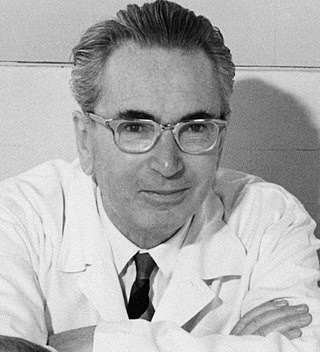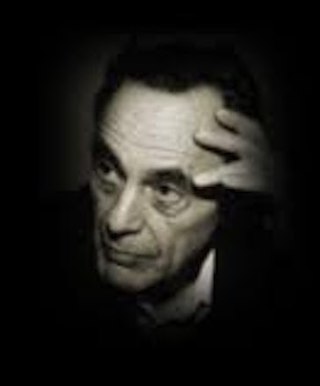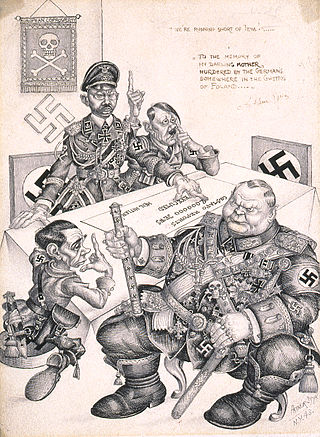Paradoxical intention (PI) is a psychotherapeutic technique used to treat recursive anxiety by repeatedly rehearsing the anxiety-inducing pattern of thought or behaviour, often with exaggeration and humor. Paradoxical intention has been shown to be effective in treating psychosomatic illnesses such as chronic insomnia, public speaking phobias, etc. by making patients do the opposite of their hyper-intended goal, hindering their ability to perform the activity.

Viktor Emil Frankl was an Austrian psychiatrist and Holocaust survivor, who founded logotherapy, a school of psychotherapy that describes a search for a life's meaning as the central human motivational force. Logotherapy is part of existential and humanistic psychology theories.

Rollo Reece May was an American existential psychologist and author of the influential book Love and Will (1969). He is often associated with humanistic psychology and existentialist philosophy, and alongside Viktor Frankl, was a major proponent of existential psychotherapy. The philosopher and theologian Paul Tillich was a close friend who had a significant influence on his work.

Man's Search for Meaning is a 1946 book by Viktor Frankl chronicling his experiences as a prisoner in Nazi concentration camps during World War II, and describing his psychotherapeutic method, which involved identifying a purpose to each person's life through one of three ways: the completion of tasks, caring for another person, or finding meaning by facing suffering with dignity.
Logotherapy was developed by neurologist and psychiatrist Viktor Frankl and is based on the premise that the primary motivational force of an individual is to find a meaning in life. Frankl describes it as "the Third Viennese School of Psychotherapy" along with Freud's psychoanalysis and Adler's individual psychology.
Existential psychotherapy is a form of psychotherapy based on the model of human nature and experience developed by the existential tradition of European philosophy. It focuses on concepts that are universally applicable to human existence including death, freedom, responsibility, and the meaning of life. Instead of regarding human experiences such as anxiety, alienation and depression as implying the presence of mental illness, existential psychotherapy sees these experiences as natural stages in a normal process of human development and maturation. In facilitating this process of development and maturation existential psychotherapy involves a philosophical exploration of an individual's experiences while stressing the individual's freedom and responsibility to facilitate a higher degree of meaning and well-being in his or her life.

Eugene Tovio Gendlin was an American philosopher who developed ways of thinking about and working with living process, the bodily felt sense and the "philosophy of the implicit". Though he had no degree in the field of psychology, his advanced study with Carl Rogers, his longtime practice of psychotherapy and his extensive writings in the field of psychology have made him perhaps better known in that field than in philosophy. He studied under Carl Rogers, the founder of client-centered therapy, at the University of Chicago and received his PhD in philosophy in 1958. Gendlin's theories impacted Rogers' own beliefs and played a role in Rogers' view of psychotherapy. From 1958 to 1963 Gendlin was Research Director at the Wisconsin Psychiatric Institute of the University of Wisconsin. He served as an associate professor in the departments of Philosophy and Comparative Human Development at the University of Chicago from 1964 until 1995.

Muselmann was a term used amongst prisoners of German Nazi concentration camps during the Holocaust of World War II to refer to those suffering from a combination of starvation and exhaustion, as well as those who were resigned to their impending death. The Muselmann prisoners exhibited severe emaciation and physical weakness, an apathetic listlessness regarding their own fate, and unresponsiveness to their surroundings owing to their barbaric treatment.

Kaufering was a system of eleven subcamps of the Dachau concentration camp which operated between 18 June 1944 and 27 April 1945 and which were located around the towns of Landsberg am Lech and Kaufering in Bavaria.
William S. Breitbart, FAPM, is an American psychiatrist in Psychosomatic Medicine, Psycho-oncology, and Palliative Care. He is the Jimmie C Holland Chair in Psychiatric Oncology, and the Chief of the Psychiatry Service, Department of Psychiatry and Behavioral Sciences, Memorial Sloan-Kettering Cancer Center, He is a Professor of Clinical Psychiatry at Weill Medical College of Cornell University. He was president of the Academy of Psychosomatic Medicine, and the Editor-in-Chief of Palliative and Supportive Care.
Meaning in existentialism is descriptive; therefore it is unlike typical, prescriptive conceptions of "the meaning of life". Due to the methods of existentialism, prescriptive or declarative statements about meaning are unjustified. The root of the word "meaning" is "mean", which is the way someone or something is conveyed, interpreted, or represented. Each individual has his or her own form of unique perspective; meaning is, therefore, purely subjective. Meaning is the way something is understood by an individual; in turn, this subjective meaning is also how the individual may identify it. Meaning is the personal significance of something physical or abstract. This would include the assigning of value(s) to such significance.
Self-transcendence is a personality trait that involves the expansion or evaporation of personal boundaries. This may potentially include spiritual experiences such as considering oneself an integral part of the universe. Several psychologists, including Viktor Frankl, Abraham Maslow, and Pamela G. Reed have made contributions to the theory of self-transcendence.

The Unconscious God is a book by Viktor E. Frankl, the Viennese psychiatrist and founder of Logotherapy. The book was the subject of his dissertation for a Ph.D. in philosophy in 1948.
Noogenic neurosis is a term in logotherapy denoting a form of neurosis stemming from "existential frustration". The term was coined by Dr. Viktor Frankl, the founder of logotherapy.

Existential Psychotherapy is a book about existential psychotherapy by the American psychiatrist Irvin D. Yalom, in which the author, addressing clinical practitioners, offers a brief and pragmatic introduction to European existential philosophy, as well as to existential approaches to psychotherapy. He presents his four ultimate concerns of life—death, freedom, isolation, and meaninglessness—and discusses developmental changes, psychopathology and psychotherapeutic strategies with regard to these four concerns.

Paul T. P. Wong is a Canadian clinical psychologist and professor. His research career has gone through four stages, with significant contributions in each stage: learning theory, social cognition, existential psychology, and positive psychology. He is most known for his integrative work on death acceptance, meaning therapy, and second wave positive psychology. He has been elected as a fellow for both the American Psychological Association and the Canadian Psychological Association.
Joseph B. Fabry was an Austrian-American writer associated with the logotherapy movement.
The International Network on Personal Meaning (INPM) is a nonprofit organization devoted to advancing meaning-centred research and interventions. It was founded by Paul T. P. Wong in 1998. Inspired by Viktor Frankl's logotherapy, Wong wanted to expand Frankl's vision to include the contemporary positive psychology movement. Therefore, the INPM provides a "big tent" for both existential-humanistic psychologists and positive psychologists in their biennial International Meaning Conferences and their journal, the International Journal of Existential Psychology and Psychotherapy.
Elisabeth Lukas is an Austrian psychiatrist and is one of the central figures in logotherapy, a branch of psychotherapy founded by Viktor Frankl. Lukas is an author of 30 books, translated into 16 languages.

There are several major aspects of humor related to the Holocaust: humor of the Jews in Nazi Germany and in Nazi concentration and extermination camps, a specific kind of "gallows humor"; German humor on the subject during the Nazi era; the appropriateness of this kind of off-color humor in modern times; modern anti-Semitic sick humor.











